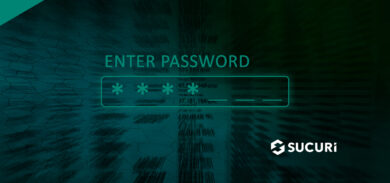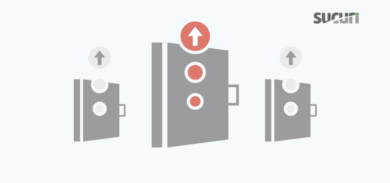With the new pandemic hovering over our heads, the main piece of advice from most countries is stay home. Working remotely is a new reality for many people around the world, and Sucuri can help you make this new endeavor easier for you. We have been an entirely remote team since the creation of the company, more than 10 years ago.
Working from home has its perks and challenges. We asked our colleagues what recommendations they had for people who are starting to work from home as well as some advice to mitigate cybersecurity risks.

What are the perks of working remotely?
Well, besides the advantage of never experiencing traffic, I have the flexibility to work hard and also be able to take care of my kids at home, when needed. It also means that I can immediately cuddle with a pet whenever I’m stressed.
How do you organize your time?
I like to plan my days the night before so I start the day with a plan of action. This means I start each day with a to-do list and two or three Must Do priorities. I like to create time blocks for certain tasks in my Outlook calendar and I also have reminders set for tasks that need to be taken care of on certain days. If I don’t finish up my to-do list, I log back in to finish up that task or tasks after some family time.
How do you deal with distractions when working at home?
As my fellow working moms will understand, kids can be a distraction! But I try to work around their schedule; their nap times are when I perform more detailed tasks or things that require more concentration. It also helps if you team up with your spouse/partner. For example, if you have a call at 11 a.m. and they’ve got a call at 5 p.m., you take turns covering for each other. Cell phones are another common distraction. I like to keep mine in a different room; you can’t get distracted if it’s not even around you.
How do you communicate with peers?
Slack is our communication tool of choice. I use it a lot to keep up with my team as a whole and individually. It also makes you feel less alone when you’re in constant communication.
What personal security tips would you give to somebody who has just started working online?
Password protect your WiFi. This is a big vulnerability that is super easy to fix. Also, use a password app like LastPass so you get secure passwords generated for you, and you never need to bother remembering them.

What are the perks of working remotely?
The perks of working remotely are that you’re eliminating the morning commute. For someone who lives in a relatively rural area, that makes it a lot easier to get the day started and not waste an incredible amount of time. It turned out that I was spending up to three hours a day commuting, and that will leave you with minimal time to enjoy yourself.
How do you organize your time?
Organizing my time without a supervisor is not really a problem. In the end, you’re going to be accountable for the work you do, and in a remote situation, you’ll have to show results. However, management tools are a great way for supervisors and employees to keep track of what they’re doing. I’ve used a couple different ones like Asana, Robohead, and Monday.
How do you deal with distractions when working at home?
Distractions are going to be tough. However, it’s not like this isn’t the case in an office… Has anyone ever actually counted how much time small talk takes up at the average workplace? You’re going to have to have conversations with your family to let them know when it’s acceptable to interrupt you. However, there will be distractions out of your control like noisy neighbors. I usually drown them out with music. I’d also recommend setting up an actual work area if you can, as you’re going to have to be able to compartmentalize your work and leisure time. Making a specific area or “office” will help exponentially with that. Working on the couch is terrible for your back and neck. A good chair helps too. I have an $80 IKEA one that is by no means perfect, but an added lumbar pillow worked out for me. Make sure to take regular breaks as well; I find a 15-minute yoga exercise or meditation is a great way to reset when I need to focus.
How do you communicate with peers?
Communication is going to be key, but ditch using email and switch to a chat program like Slack with Zoom or some other video chat client. Microsoft Teams can also be helpful, as it has a built-in video chat option. If you need a quick easy solution, there are free chat apps like Skype, Facebook Messenger, or Google Hangouts that can help.
What personal security tips would you give to somebody who has just started working online?
For online security, strong passwords and multifactor authentication are going to be key to keeping your information secure. Password managers can make this much easier. They’ll both generate and store passwords. I prefer LastPass, but there is also 1Password and KeePass.

What are the perks of working remotely?
Snacks. Snacks are amazing! Another big perk is I’m already at my office. I ramp up my work day faster than having to drive in, maybe sitting in traffic for extended periods of time. There’s nothing like having the flexibility of your own home or your favorite coffee shop. Comfort is a huge perk!
How do you organize your time?
Actionable deliverables. Being empowered and trusted to work on your own spawns productivity, not the opposite. I know on an hourly, daily, weekly basis what I need to deliver and what my team needs to deliver. I use checklists and touchpoints when appropriate with the team. This is set on a project or task basis. As long as we’re communicating pain points and progress, we can stay on track. Things like daily or weekly scrums and open communication channels like Slack can help work through dependencies and any roadblocks that may come up.
How do you deal with distractions when working at home?
It is important to have some separation from your daily home life. Having a private area for work is important. Setting boundaries and expectations with the family helps everyone understand what’s what. One can argue that you have better control at home than you do at the office when your teammates that are on break want to hang and chat. It’s actually quite simple and effective.
How do you communicate with peers?
We have wonderful tools like Zoom and Slack, even email for every day communications. We also leverage tools like Confluence company forums to communicate.
What personal security tips would you give to somebody who has just started working online?
Make sure you have your computer and software updated with the latest patches. This is a crucial step to making sure your environment is safe. Leveraging a company VPN is a great way to secure your communications and work anywhere you connect. Try to stay away from public, non-secure WiFi wherever possible and be vigilant around the sites you visit and the links you open up that could be malicious.

What are the perks of working remotely?
Besides having no stress with commuting and less expenses, I get to watch edX courses on my home theater on lunch hour.
How do you organize your time?
You need to follow a time management technique. I am particularly a fan of the Pomodoro technique, so I use a stopwatch to divide the work into intervals, traditionally 25 minutes long, separated by short intervals. This also allows me to stretch and drink water more regularly.
How do you deal with distractions when working at home?
That’s a challenge. Because you work at home, people tend to think you are always available. I set a few goals on the beginning of the day with specific time limits, so I close the office door, wear my headphones ATH-M40x, play a concentration playlist on Spotify, and do my best to finish the tasks in time without distractions.
How do you communicate with peers?
Slack, Zoom, emails and JIRA. Slack helps me to keep an open dialogue with the team and my boss. Zoom is used for meetings. Emails keep important information on record for everyone. And JIRA organizes and records the progress of the work.
What personal security tips would you give to somebody who has just started working online?
- Have a good router with commercial-grade network security to prevent the exploitation of your devices, especially IoTs. At Sucuri, we mitigate DDoS from poorly configured devices every day.
- If you can, connect your computer into the router with a cable and stop any local sharing services that your computer may be part of.
- Install a software firewall on your computer and allow only the protocols and ports you need.
- Connect to your company’s VPN before accessing any company’s resources.
- Use a JavaScript blocker in your browser to prevent the execution of unwanted scripts.

What are the perks of working remotely?
Oh, there are so many! I know I’m privileged to work in a position that allows me to have flexible hours and stay focused on delivery, so I don’t see this as working an 8-to-5 office life. I’m with my family all the time, so my breaks are always with them. And coffee! Yeah, I can brew my own and don’t need to rely on coffee machines or carafes filled two days ago.
How do you organize your time?
We rely on communication tools like Slack and Zoom to share how things are going, if there are any roadblocks, and how to address them. But again, my job allows me to be flexible with time.
How do you deal with distractions when working at home?
I’ve been working from home since 2012. And the hardest thing in the beginning wasn’t the distractions but disconnecting from work. There will always be things to be done. Add some hard breaks on your day and don’t try to compensate for the distractions, there are several ones in the office as well
How do you communicate with peers?
Slack and Zoom.
What personal security tips would you give to somebody who has just started working online?
Increase your paranoia level. Don’t use a company-provided computer for personal stuff. Use a VPN.

What are the perks of working remotely?
There are several of them. First of all, as you could imagine, is the absence of commuting when reaching your workplace, so you save a significant amount of time per day. Another one would be the ease to adapt your workplace to your needs and customize it to your taste, so you could build your own inspirational/productive space. Besides that, it helps with your family and work-life balance, due to the fact that you are already at home with your beloveds.
How do you organize your time?
This is the hardest part when you are used to being in an office or under supervision. It’s essential to create a routine and follow it strictly in order to help your mind to switch between working time and spare time. The very first thing I do when I start working is to organise my tasks of the day in my agenda. So, I would say routine and discipline. Don’t forget to do some breaks from time to time, your body needs to stretch legs and move a little bit every one or two hours.
How do you deal with distractions when working at home?
That’s something inevitable, and it is not possible to avoid them totally. However, everyone has some tricks in order to make this easier. For instance, I switch off notifications in my mobile phone, use a headset and challenge myself to finish the task I have in my plate already in a specific amount of time, normally slices of an hour. On top of that, in my opinion, it is important to have the possibility of having different spaces for working and living, ideally separate rooms.
How do you communicate with peers?
Using Slack and Zoom, chat and video conferences respectively. Also email, depending on the type of communication needed in each moment.
What personal security tips would you give to somebody who has just started working online?
There are several measures that should have present every day when working remotely:
- Update all your applications, including your OS. I can’t stress this enough, but this is very important.
- Use a headset to guarantee that things said are not being heard by others. Also be careful with the information you share by voice; others around can hear it.
- Be careful with the Wifi and router security, hardening the passwords and using the highest security available (don’t use WEP, WPA2 is OK). If you don’t have control of the connection point, always avoid open Wifis connections. Consider using your phone data connection in tethering mode.
- Lock your session every time you are away from your laptop/PC.
- Use VPN whenever it is available.
Keep in mind that always the best advice is to use common sense.

What are the perks of working remotely?
- I work at my own pace.
- Minimum social interactions.
- Commuting is not required – saving time/money, don’t have to go outside in bad weather.
- I can work and travel at the same time.
- Work permits and visas are not required to work for an overseas employer.
How do you organize your time?
When you do the work that is interesting to you personally, you don’t need much supervision.
How do you deal with distractions when working at home?
Don’t blame yourself if you got distracted by family members, friends or an interesting TV show. Sometimes they need your attention – feel grateful that you have the opportunity to help someone or have a good time every once in a while. However, don’t forget about your job and let people know (including yourself) that although you are staying at home you are not on vacation and your friends and family should respect it.
How do you communicate with peers?
Team chat works great. Videoconferences help with more live communications. Offline team meeting allow you to meet people in person
What personal security tips would you give to somebody who has just started working online?
- Isolate your personal and work environments on computers.
- Don’t use work accounts (email, social, etc.) for personal stuff and vice versa.
- Virtual machines may help if you only have one computer.

What are the perks of working remotely?
There are lots of perks of working remotely, including not having to commute, flexibility in your schedule, and being able to manage your time more efficiently. It all comes with great responsibility, but in the end, it leads to increased productivity and a happier work life.
How do you organize your time?
You have to be very organized for a home office to work. It’s essential to have a regular set of tasks you want to accomplish on a day-to-day basis, as well as other projects within your roadmap. If you break those down into smaller chunks and each day tackle a different task towards your goal, there’s no way for it to go wrong.
How do you deal with distractions when working at home?
There are several things you can do to reduce distractions. One that worked for me was having a separate office specifically to work. It may give you the feeling that whenever you get into that place, it’s business time. Avoid working in common areas of your house (living room) or other spaces that people may go by, because since working remotely is a new concept for most folks to wrap their heads around it, some people may think that you are just browsing the internet and that could lead to interruptions and distractions. It’s also important to set the right expectations with your family members, so they can understand that during that time you’d be unavailable for chats.
How do you communicate with peers?
In the remote environment we are in, communicating is not enough, we have to over communicate. Regardless if the means are emails, chats, video-chats or whatever else. We must make great use of every tool we have at our disposal to get closer to our team members.
What personal security tips would you give to somebody who has just started working online?
The security of your company’s data should be at the top of your mind. Personal and business matters should remain separate and the same goes for your computer structure. Having a dedicated machine or working out of a Virtual Machine environment is a must. Although there is no silver bullet to security, essential security measures should do the trick for you:
– Keep all software updated, including your OS;
– Have a good AV;
– Use a password Manager software;
– Use AdBlocks;
– Use NoScript;
– Use other tools you deem necessary to protect the environment against attacks.

What are the perks of working remotely?
Personally, I love the flexibility it brings. In general, I start my days by taking a shower and having a really nice breakfast. But some days I’m in the mood to get online earlier, start on something small, get it done, go for a run, take a shower, and then breakfast. Working remotely gives me the flexibility of starting my day either way.
How do you organize your time without supervision?
One of the things that helps me the most is creating a to-do list of the tasks I need to finish by the end of my workday. Sorting that list from complex to easier allows me to get things done in a more efficient way, which translates into a feeling of productiveness.
How do you deal with distractions when working at home?
Personally, what worked best for me was to create my own office that I could just lock up. But before I could do that, I faced many distractions at home because my family wasn’t aware that “working from home” was a thing. I went around that by creating my own distraction to put on top of the other distractions: good headsets and loud music. Now that I’m used to working with music, I can space out at will, which allows me to work pretty much everywhere. It’s pretty cool.
How do you communicate with peers?
My main channels of communication are Slack, Jira and GitHub. When face-to-face meetings are necessary we rely on Zoom. But as a developer, I have the luxury that most of the communizations between me and my teammates can happen asynchronously. One thing to be mindful of when working from home is that not all the messages are urgent.
What personal security tips would you give to somebody who has just started working online?
If you’re using a personal computer for both work and entertainment, create a dedicated account for work and entertainment, and lock them up as much as you can: use a good antivirus, configure permissions as tight as possible, only install what’s necessary and be mindful of the websites you visit. When you’re done working, simply log in to your entertainment account and enjoy your freedom – responsibly of course! P.S. Get a work laptop if that’s possible.
Key Takeaways
It can be challenging to transition from an office to working home. However, a lot of people have already been working remotely, and they love it. One of the main takeaways is for your new work setting to function, you need a clear separation between work and leisure environments. Organizing your daily tasks before even getting started is another must. If there is anything we can do to help you do this transition, feel free to reach out via our @sucurisecurity social channels. Check our personal security series for cybersecurity tips. Stay home and stay safe!








